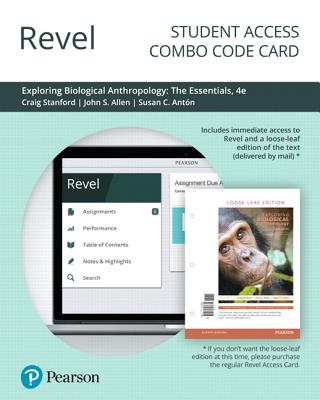

 Pearson
Pearson
Revel for Exploring Biological Anthropology: The Essentials -- Combo Access Card


Key Metrics
- Craig Stanford
- Pearson
- Computer Software or Multimedia
- 9780135193525
- -
- -
- Social Science > Anthropology - General
- English
 Secure Transaction
Secure TransactionBook Description
Revel(TM) for Exploring Biological Anthropology: The Essentials combines concise coverage of the foundations of the field with modern innovations and discoveries, helping students understand, and get excited about, the discipline. Because the authors conduct research in three of the main areas of biological anthropology - the human fossil record (Susan Ant�n), primate behavior and ecology (Craig Stanford), and human biology and the brain (John Allen) - they offer a specialist approach that engages students and gives them everything they need to master the subject. Revel for the Fourth Edition continues to present traditional physical anthropology within a modern Darwinian framework, and includes coverage of contemporary discoveries to highlight the ever-increasing body of knowledge in biological anthropology.
Revel is Pearson's newest way of delivering our respected content. Fully digital and highly engaging, Revel replaces the textbook and gives students everything they need for the course. Informed by extensive research on how people read, think, and learn, Revel is an interactive learning environment that enables students to read, practice, and study in one continuous experience - for less than the cost of a traditional textbook.
NOTE: This Revel Combo Access pack includes a Revel access code plus a loose-leaf print reference (delivered by mail) to complement your Revel experience. In addition to this access code, you will need a course invite link, provided by your instructor, to register for and use Revel.
Author Bio
Craig Stanford is a biological anthropologist and professor of Anthropology and Biological Sciences at USC, and has conducted extensive field research on wild great apes, monkeys, and other animals. His work has often focused on the ecological relationships among the primate species sharing a tropical forest ecosystem.
He has conducted field studies in East Africa, South Asia, Southeast Asia, and Central and South America. In addition to 15 years research on chimpanzee behavioral ecology in East Africa, he has recently been collaborating in studies on endangered Asian primates and other animals.
The author of more than a dozen books and 100 scholarly articles, he also holds a research appointment in vertebrate biology at the Los Angeles County Museum of Natural History, and is involved in the biology and conservation of endangered tortoises in southeast Asia.
Source: University of Southern California
Videos










Community reviews
Write a ReviewNo Community reviews